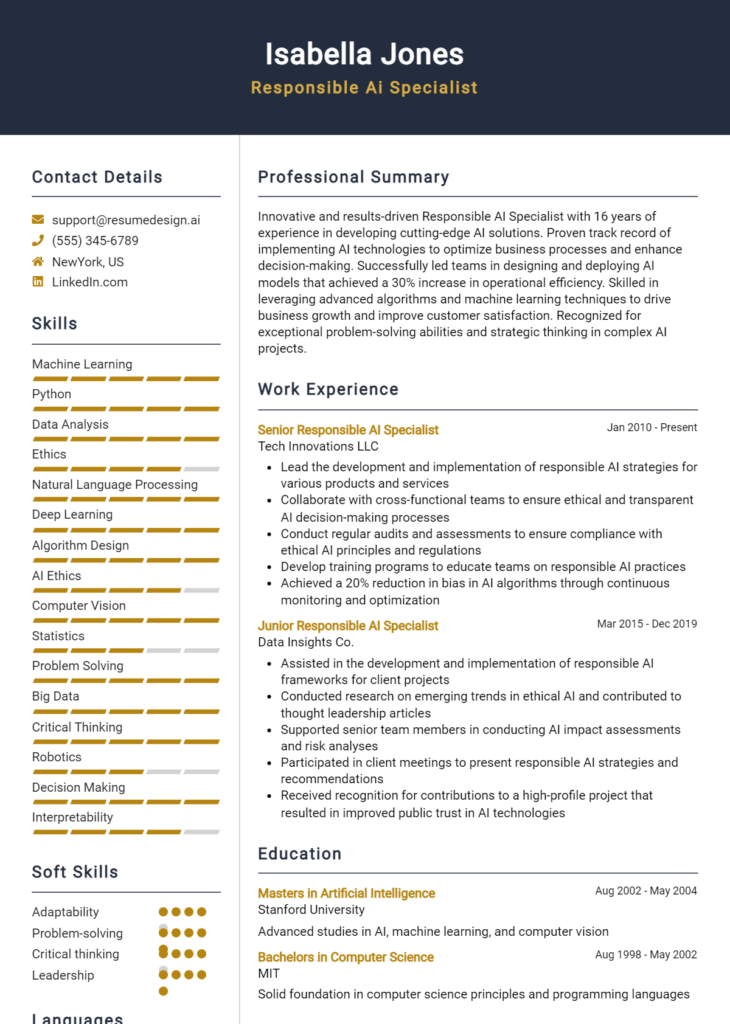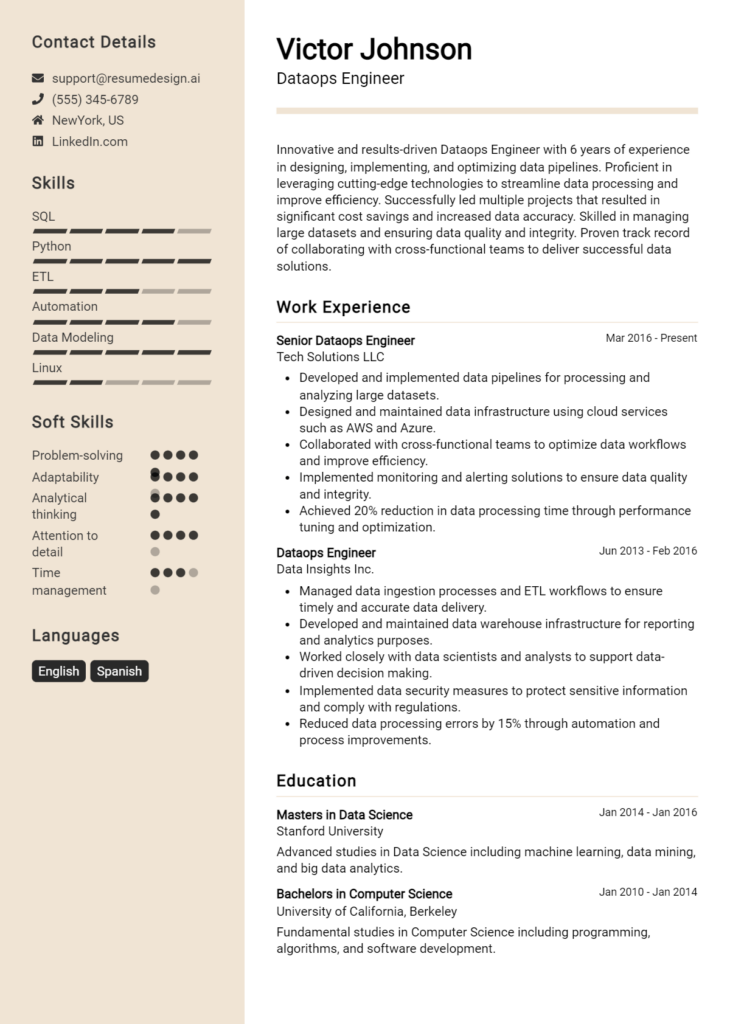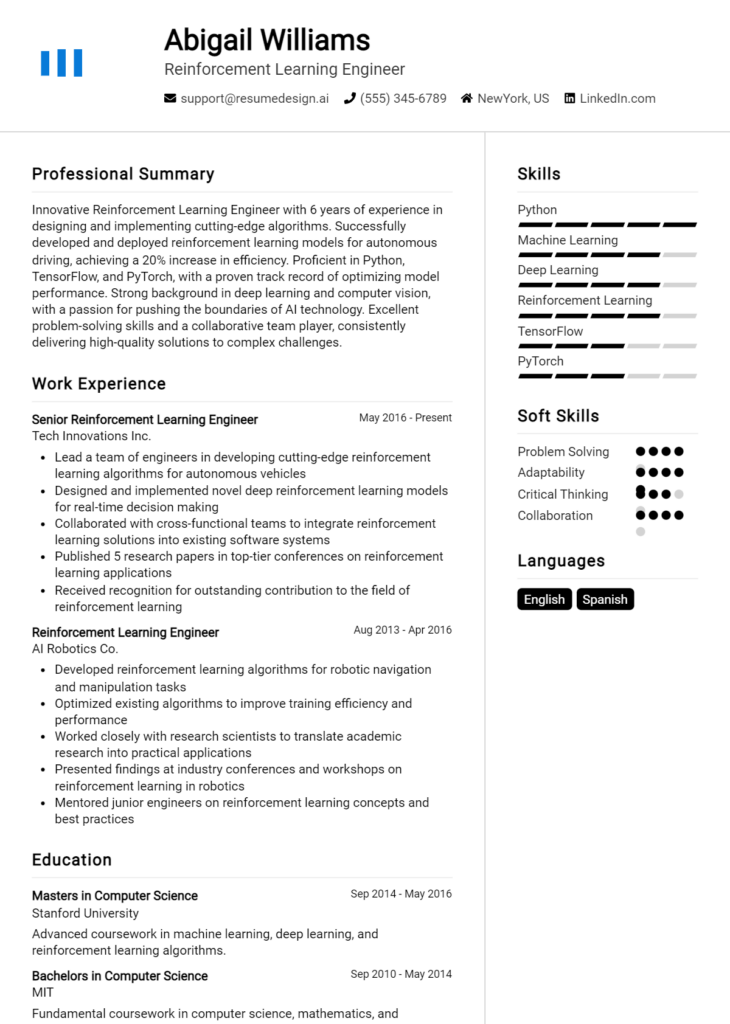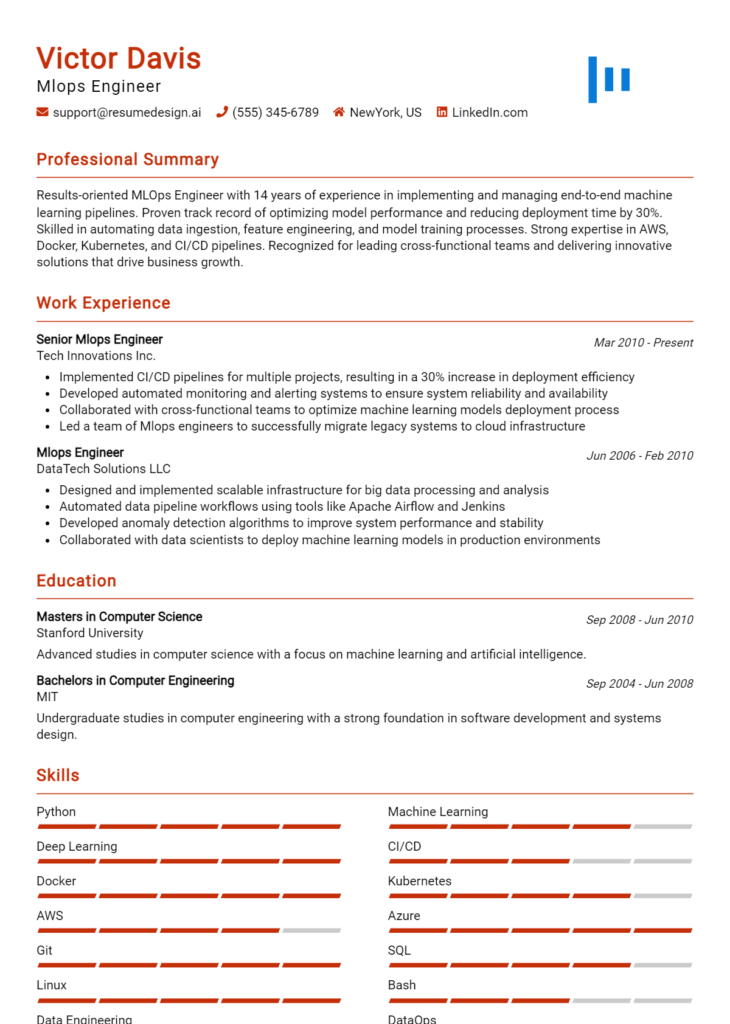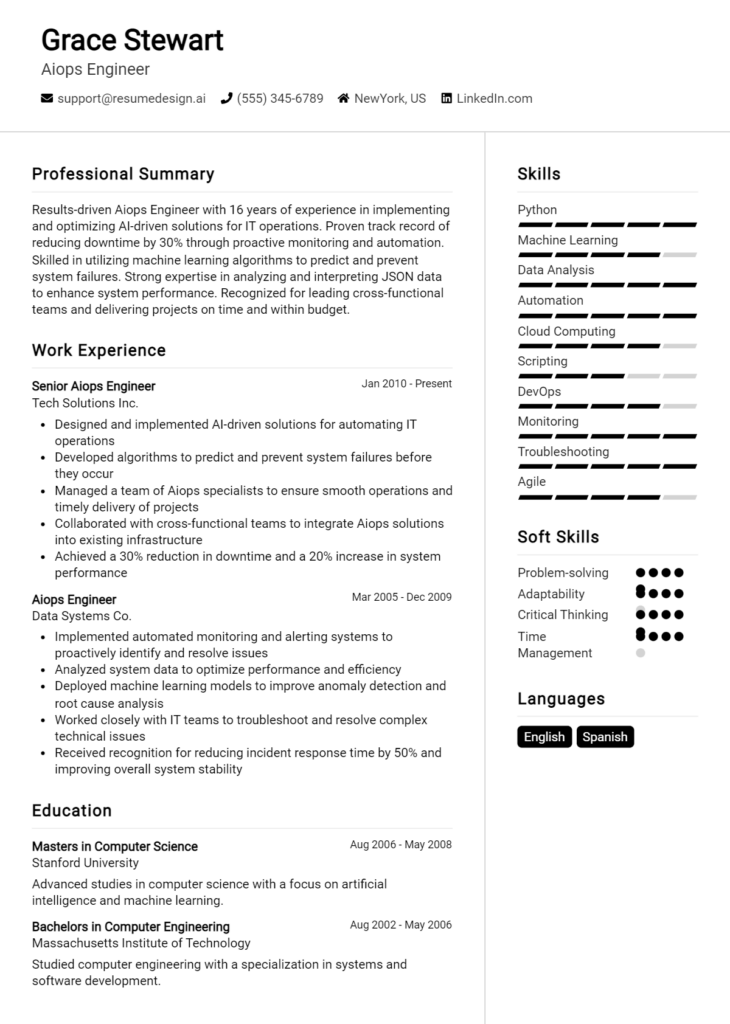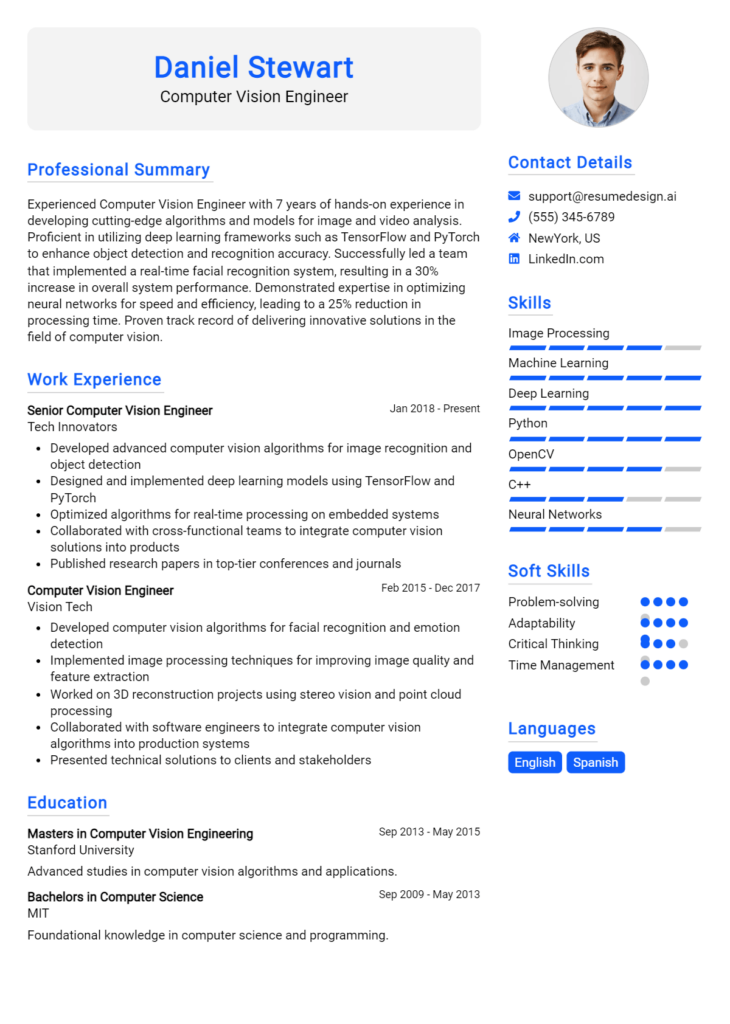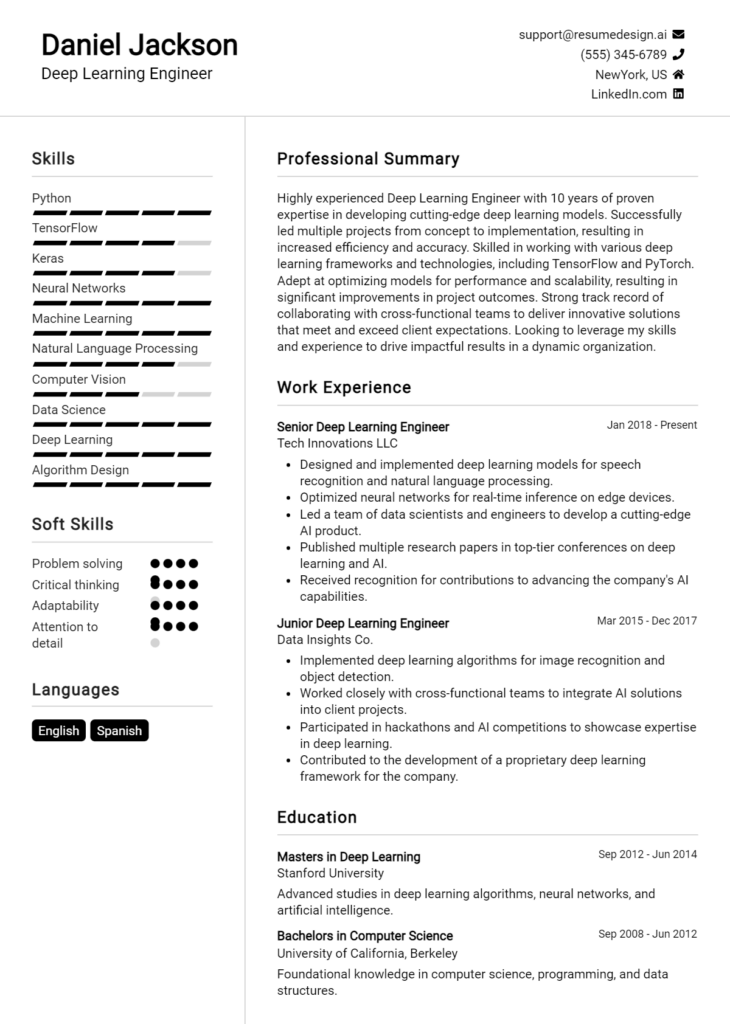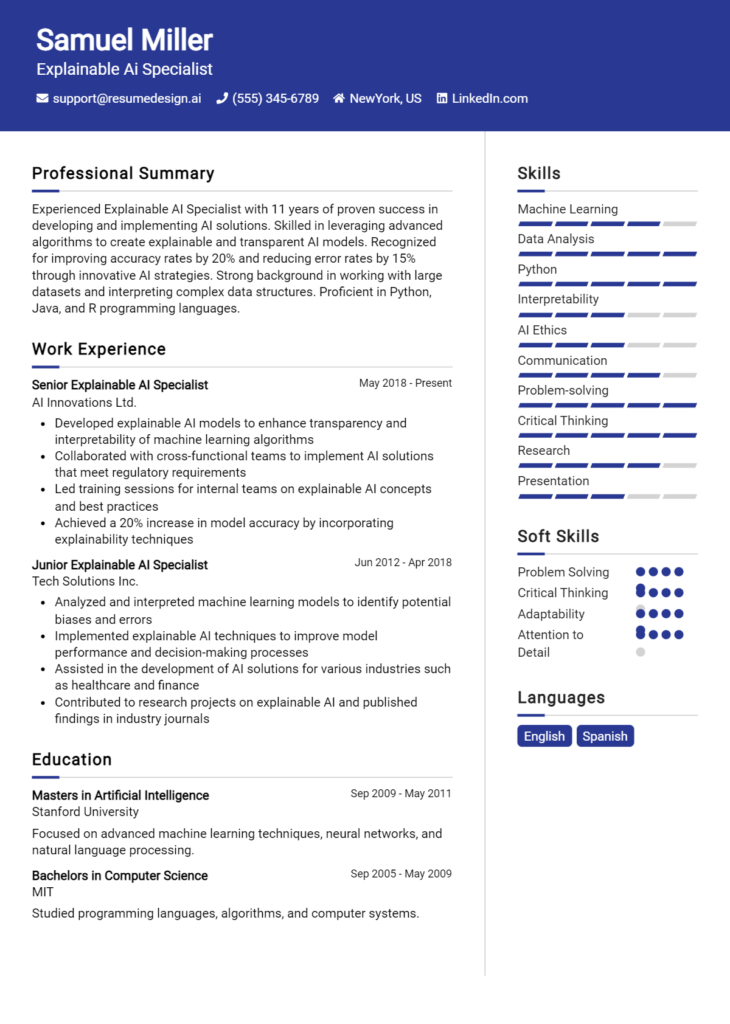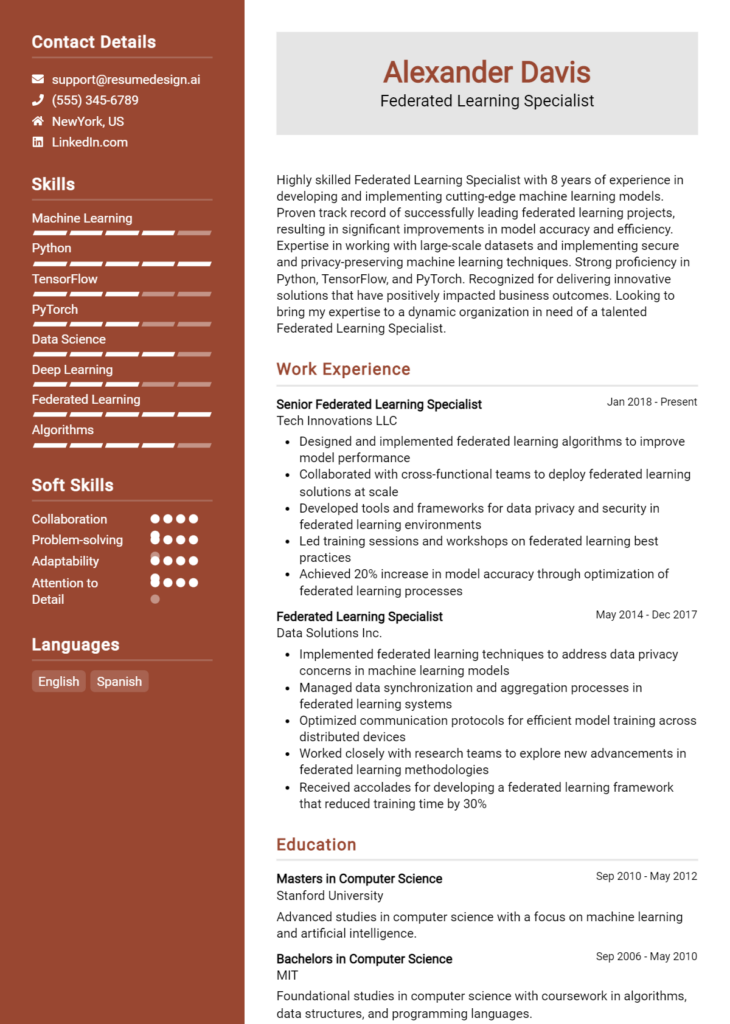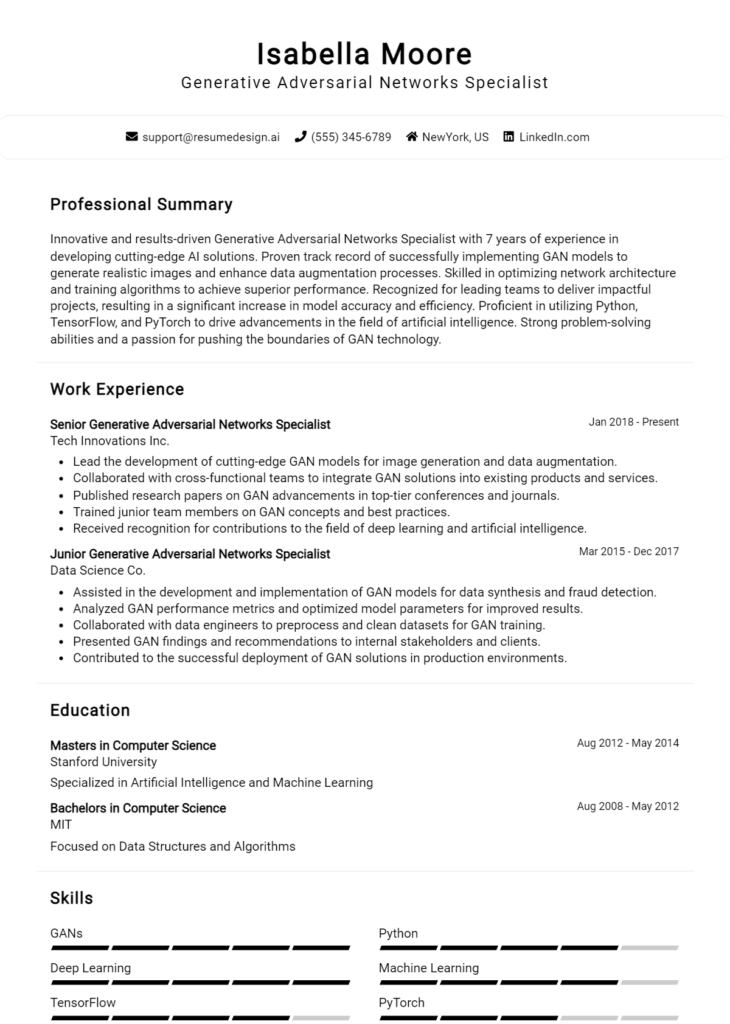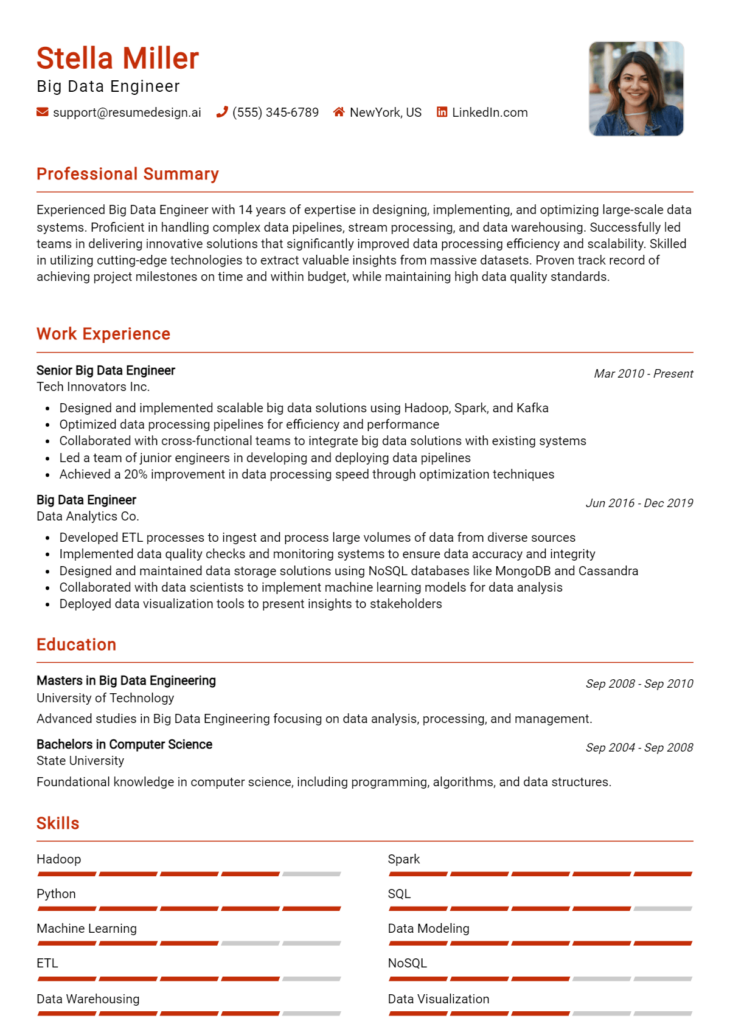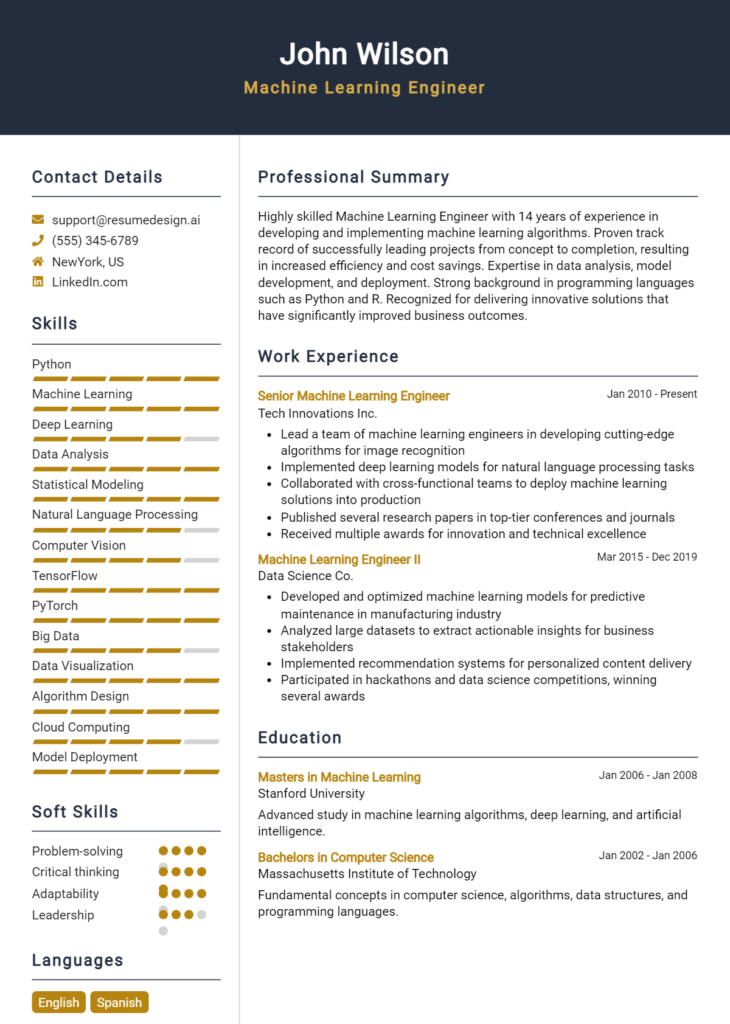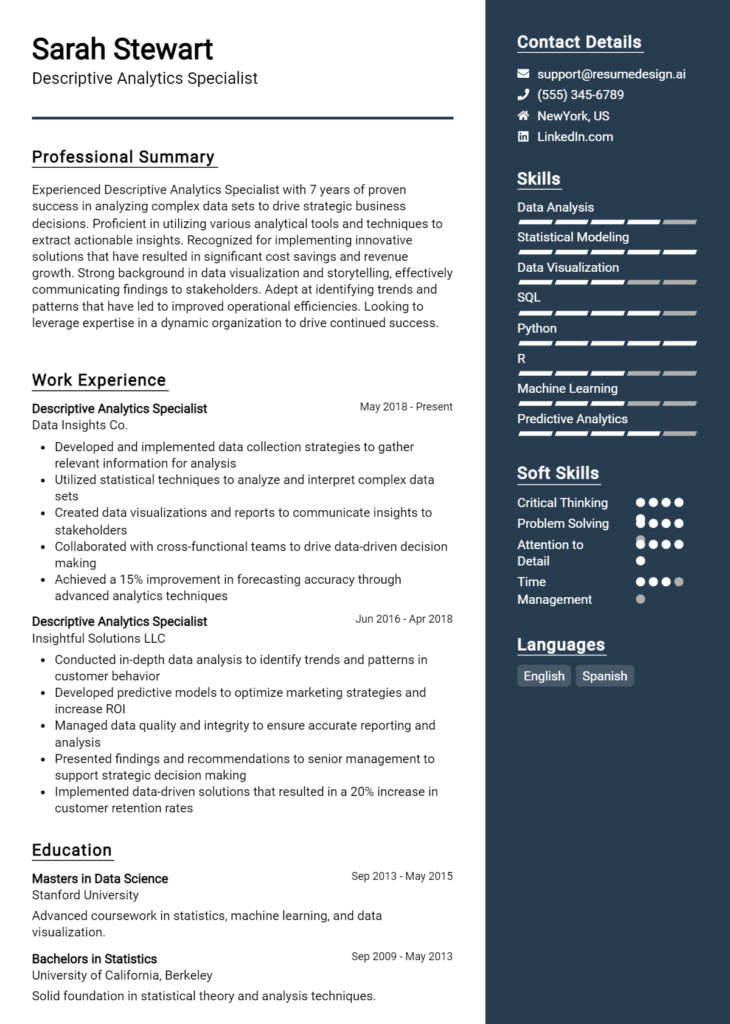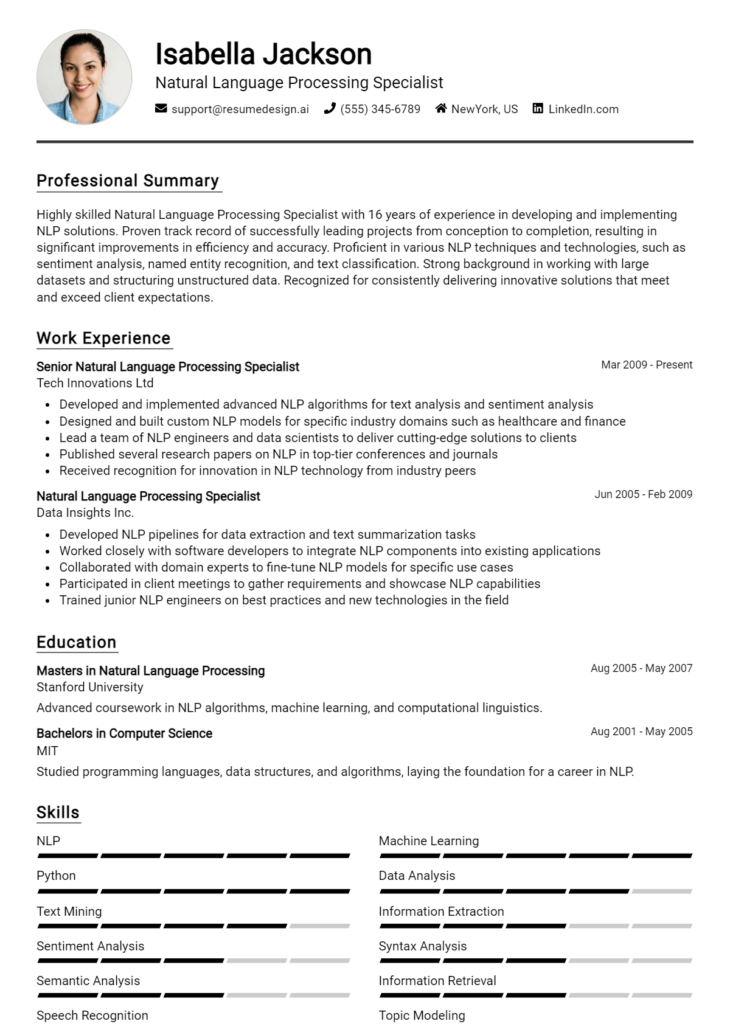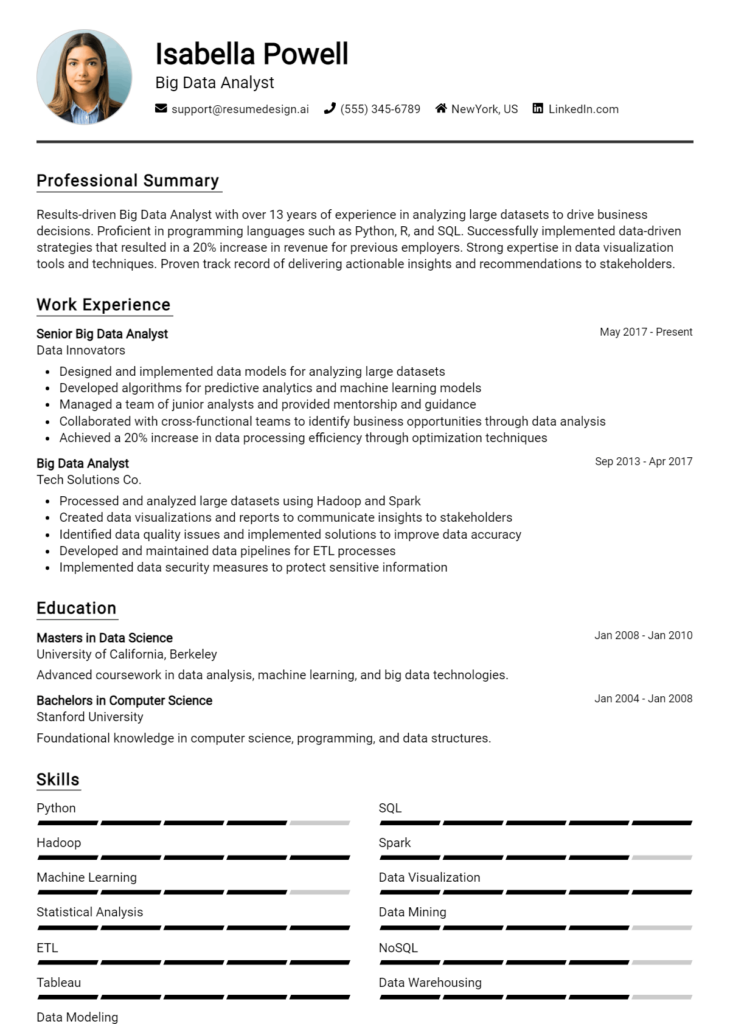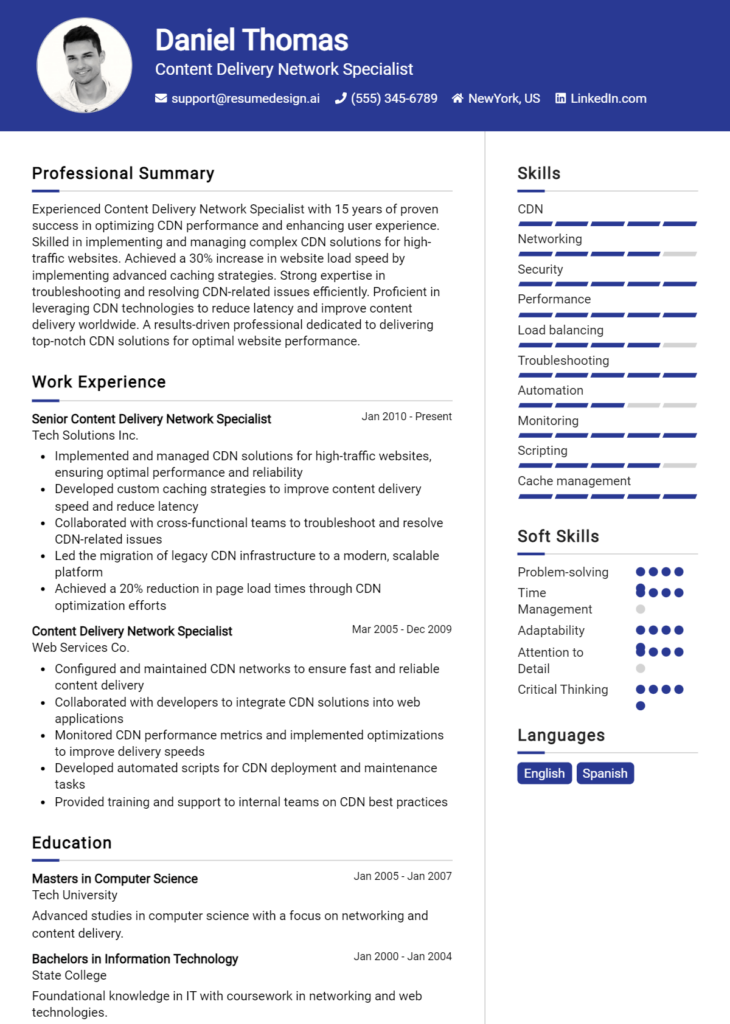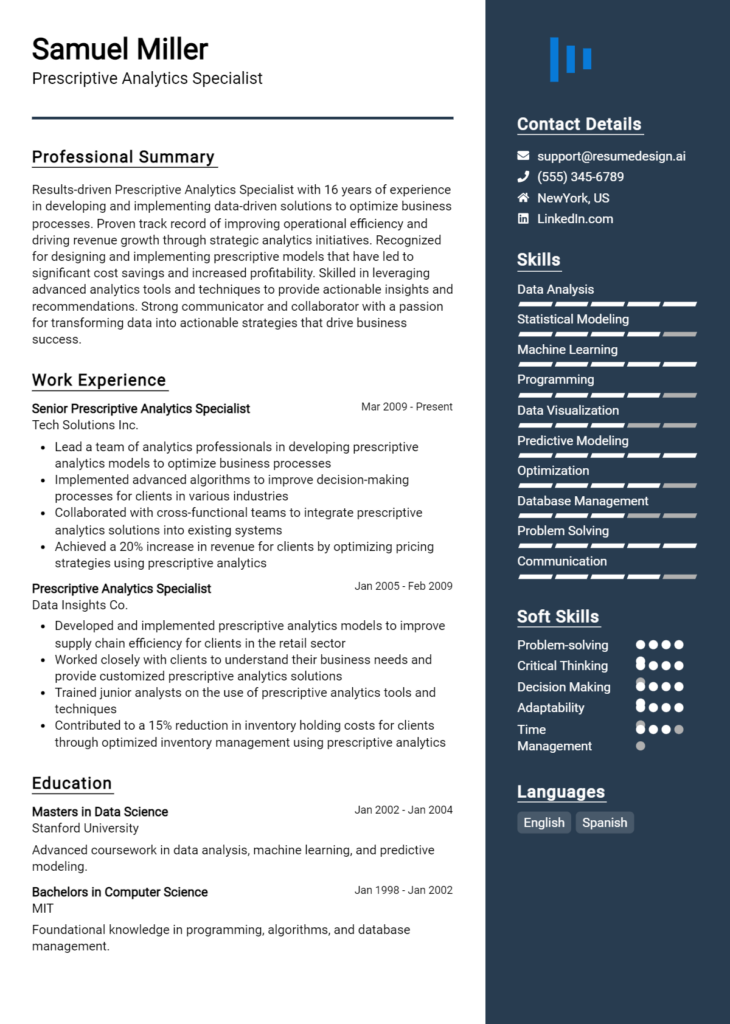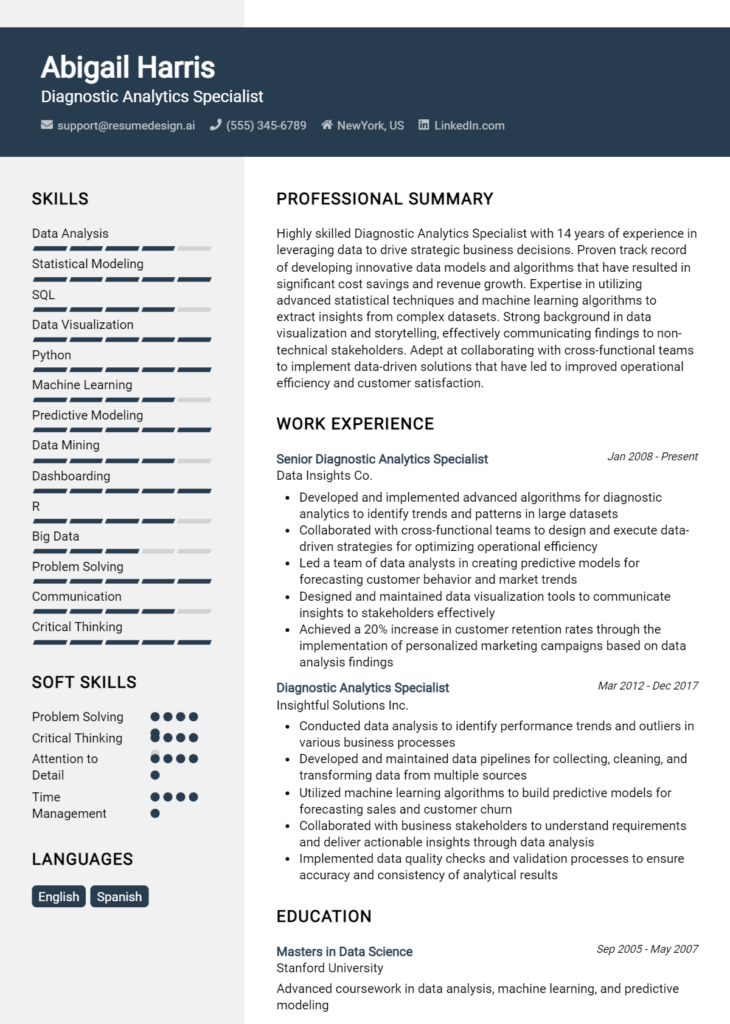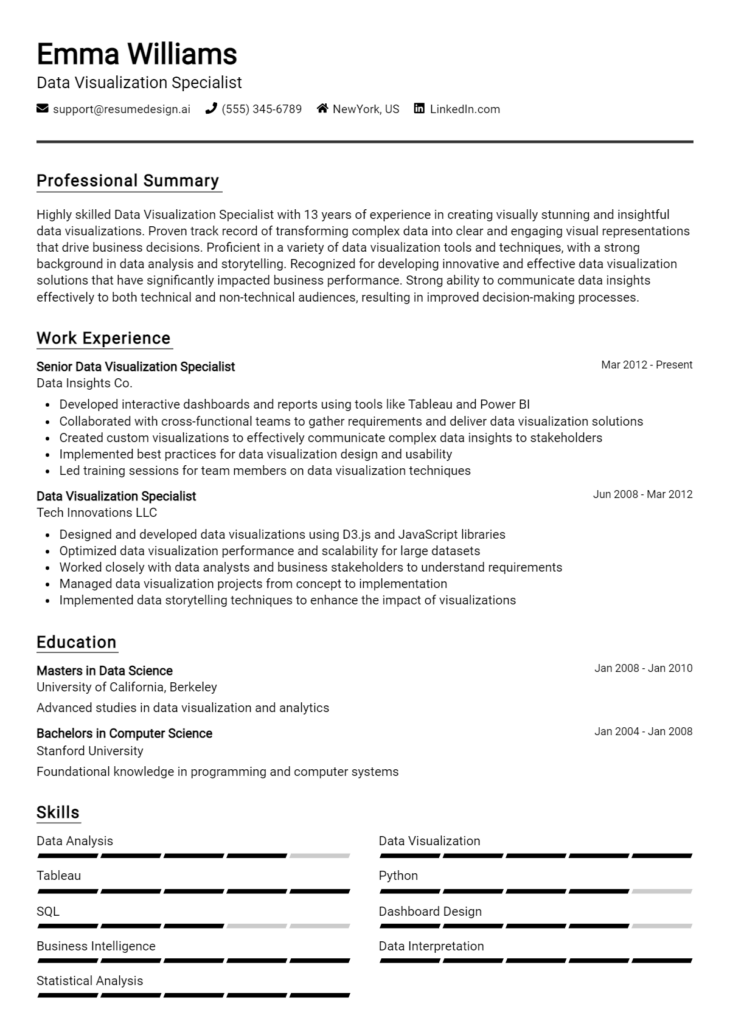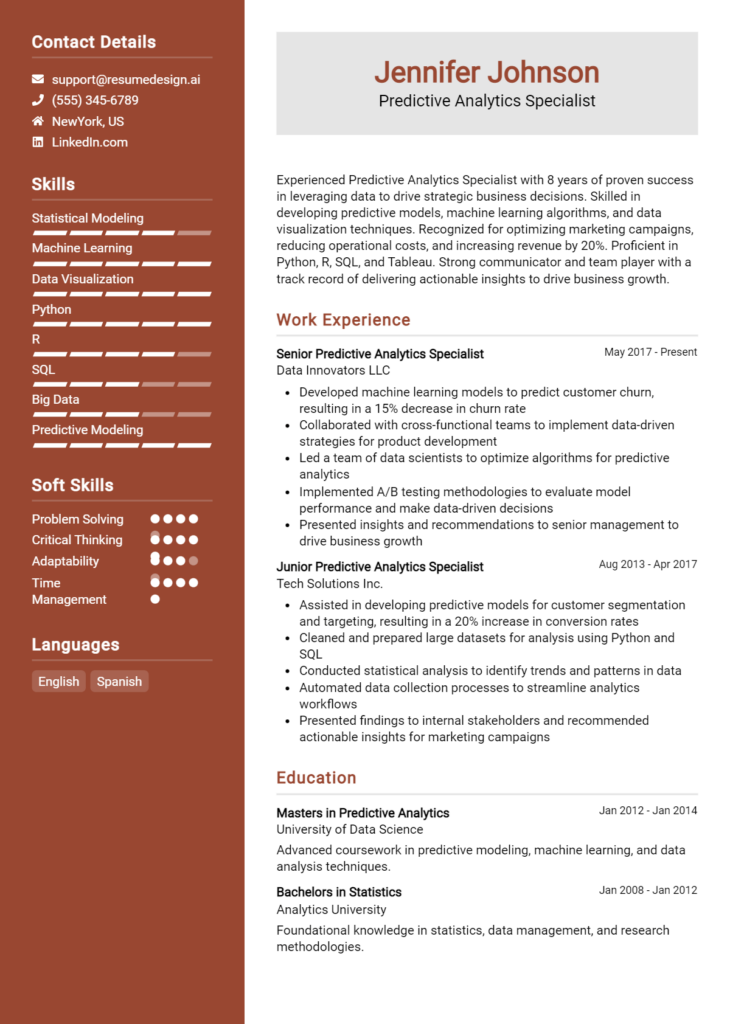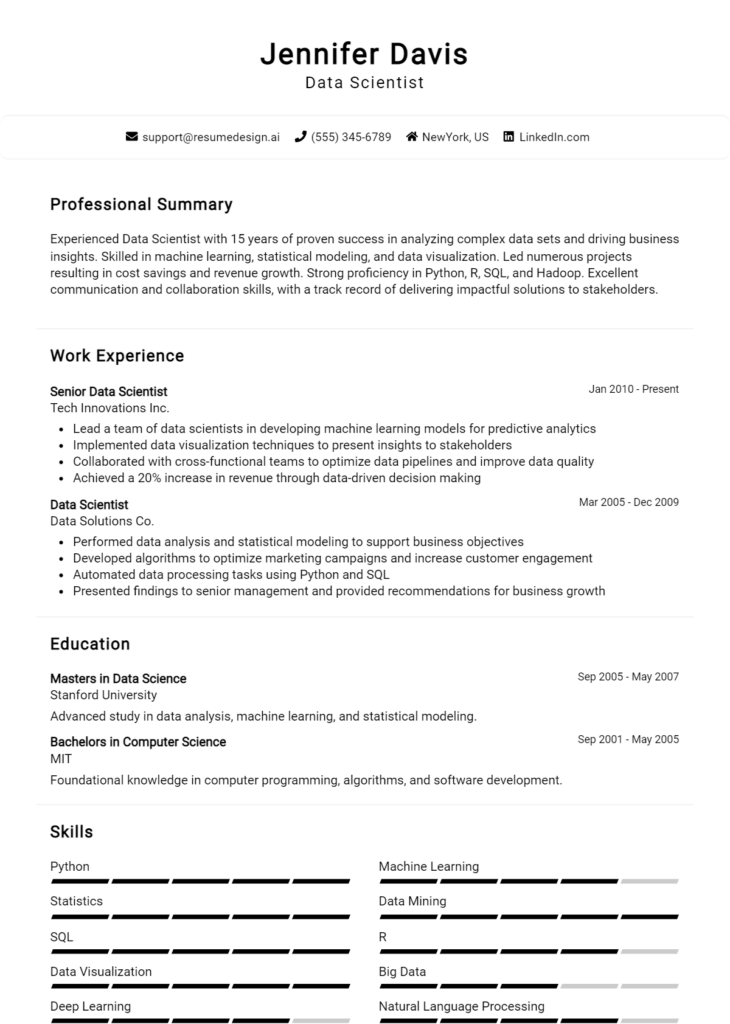Data Analyst Core Responsibilities
A Data Analyst plays a crucial role in transforming raw data into actionable insights, bridging various departments such as marketing, finance, and operations. Key responsibilities include data collection, data cleaning, and statistical analysis, requiring strong technical skills in tools like SQL, Python, and Excel. Operationally, they must interpret complex data sets to solve problems and support decision-making processes. A well-structured resume highlighting these skills is essential to demonstrate their value in achieving organizational goals.
Common Responsibilities Listed on Data Analyst Resume
- Collecting and interpreting data from various sources.
- Cleaning and validating data to ensure accuracy.
- Conducting statistical analysis to identify trends and patterns.
- Creating visualizations and reports to present findings.
- Collaborating with cross-functional teams to understand data needs.
- Developing and maintaining databases and data systems.
- Identifying opportunities for process improvement through data analysis.
- Tracking key performance indicators (KPIs) to measure success.
- Assisting in forecasting and predictive analytics.
- Communicating insights to stakeholders effectively.
- Staying updated with industry trends and best practices in data analysis.
- Utilizing data visualization tools to enhance data presentation.
High-Level Resume Tips for Data Analyst Professionals
In the competitive landscape of data analytics, a well-crafted resume serves as a crucial tool for professionals looking to make their mark. As the first impression a candidate has on potential employers, your resume needs to effectively showcase not only your skills but also your past achievements and experiences. A strong resume can set you apart from the crowd, highlighting your analytical prowess, attention to detail, and ability to derive actionable insights from complex data sets. This guide will provide practical and actionable resume tips specifically tailored for Data Analyst professionals, ensuring that you can present your qualifications in the best light possible.
Top Resume Tips for Data Analyst Professionals
- Tailor your resume to the job description by incorporating relevant keywords that align with the specific requirements of the role.
- Highlight your technical skills, such as proficiency in SQL, Python, R, or data visualization tools like Tableau and Power BI.
- Showcase relevant experience by detailing past roles, responsibilities, and the types of data projects you've worked on.
- Quantify your achievements with specific metrics, such as improved efficiency percentages, revenue growth, or successful project completions.
- Include a summary statement that succinctly captures your expertise and what you bring to the role.
- Highlight industry-specific skills or certifications, such as data governance, data warehousing, or statistical analysis.
- Utilize bullet points for clarity, making it easy for hiring managers to skim through your qualifications quickly.
- Incorporate soft skills such as communication, problem-solving, and teamwork, demonstrating your ability to collaborate with stakeholders.
- Keep your design clean and professional, ensuring that formatting is consistent and easy to read.
By implementing these tips, you can significantly enhance your chances of landing a job in the Data Analyst field. A resume that effectively showcases your skills and achievements will resonate with hiring managers and set the stage for successful interviews, ultimately helping you to advance your career in this dynamic and rewarding domain.
Why Resume Headlines & Titles are Important for Data Analyst
In the competitive job market for Data Analysts, having a strong resume headline or title is crucial for making a lasting first impression. A well-crafted headline serves as a hook that immediately grabs the attention of hiring managers, summarizing a candidate's key qualifications in a single impactful phrase. This brief yet powerful statement should be concise, relevant, and directly related to the specific job being applied for, effectively setting the tone for the rest of the resume. A compelling headline not only highlights the candidate's skills and experience but also demonstrates their alignment with the role, making it easier for recruiters to recognize their potential value to the organization.
Best Practices for Crafting Resume Headlines for Data Analyst
- Keep it concise: Aim for one impactful phrase, ideally under 10 words.
- Be role-specific: Tailor your headline to reflect the Data Analyst position you are applying for.
- Highlight key skills: Include essential skills or tools relevant to the job, such as SQL, Python, or data visualization.
- Showcase experience: If applicable, reference years of experience or major accomplishments.
- Use action-oriented language: Start with strong verbs that convey confidence and competence.
- Avoid generic terms: Move away from vague phrases like "Hardworking Professional" to maintain specificity.
- Incorporate industry keywords: Utilize terms that align with the job description to help your resume pass through Applicant Tracking Systems (ATS).
- Be authentic: Ensure your headline accurately reflects your qualifications and personal brand.
Example Resume Headlines for Data Analyst
Strong Resume Headlines
Data Analyst with 5 Years of Experience in Predictive Analytics and Visualization
Detail-Oriented Data Analyst Proficient in SQL and Python for Data-Driven Decision Making
Results-Driven Data Analyst Specializing in Market Research and Trend Analysis
Weak Resume Headlines
Professional with Data Skills
Experienced Analyst Looking for Opportunities
Strong resume headlines are effective because they are specific, highlight relevant skills and experiences, and immediately communicate the candidate's fit for the Data Analyst role. They provide clarity and capture attention, making it easy for hiring managers to see the candidate's potential contribution. In contrast, weak headlines fail to impress because they lack specificity and do not convey any unique value or qualifications, leaving hiring managers with little incentive to further explore the resume.
Writing an Exceptional Data Analyst Resume Summary
A resume summary is a crucial component for a Data Analyst as it serves as the first impression for hiring managers reviewing an applicant's credentials. A strong summary quickly captures attention by succinctly highlighting key skills, relevant experience, and noteworthy accomplishments tailored to the specific job role. In today's competitive job market, a concise and impactful summary can set a candidate apart, demonstrating their suitability for the position and motivating hiring managers to explore the rest of the resume.
Best Practices for Writing a Data Analyst Resume Summary
- Quantify Achievements: Use specific numbers and metrics to demonstrate your impact in previous roles.
- Focus on Key Skills: Highlight skills that are directly relevant to the job description, such as data visualization, statistical analysis, or database management.
- Be Concise: Aim for 2-4 sentences that deliver a powerful message without unnecessary fluff.
- Tailor for the Job Description: Customize your summary for each application to align with the employer's needs and requirements.
- Include Relevant Tools and Technologies: Mention specific software or programming languages you are proficient in, such as SQL, Python, or Tableau.
- Showcase Industry Knowledge: If applicable, highlight your experience in a specific industry to demonstrate your understanding of its unique challenges and data needs.
- Use Action-Oriented Language: Start sentences with strong action verbs to convey confidence and proactivity.
- Highlight Soft Skills: Don’t forget to mention critical soft skills such as problem-solving, communication, and teamwork that complement your technical abilities.
Example Data Analyst Resume Summaries
Strong Resume Summaries
Detail-oriented Data Analyst with over 5 years of experience in leveraging data analytics to drive strategic business decisions. Successfully improved data processing efficiency by 30% through the implementation of automated reporting systems, using SQL and Tableau.
Results-driven Data Analyst skilled in statistical analysis and predictive modeling, with a proven track record of increasing revenue by 15% through data-driven marketing strategies. Proficient in Python and R for advanced analytics and machine learning applications.
Dedicated Data Analyst with a knack for transforming complex datasets into actionable insights. Led a team project that optimized customer segmentation, resulting in a 25% increase in campaign response rates. Experienced in using Power BI for data visualization.
Weak Resume Summaries
Data Analyst with experience in data analysis and reporting. Good at working with data and generating insights.
Entry-level Data Analyst looking for opportunities to learn more about data and analytics. Familiar with various tools.
The examples of strong resume summaries are considered effective because they provide specific achievements, quantify results, and demonstrate relevant skills directly linked to the Data Analyst role. In contrast, the weak resume summaries lack detail, fail to convey any measurable impact, and appear too generic, which can make them easily overlooked by hiring managers seeking qualified candidates.
Work Experience Section for Data Analyst Resume
The work experience section of a Data Analyst resume is critical as it serves as a showcase for a candidate's technical skills, experience in managing teams, and ability to deliver high-quality products. This section not only highlights a candidate's proficiency with data analysis tools and methodologies but also demonstrates their capacity to collaborate effectively within teams and align their achievements with industry standards. By quantifying outcomes and presenting experiences that reflect real-world impacts, candidates can significantly enhance their appeal to potential employers.
Best Practices for Data Analyst Work Experience
- Highlight relevant technical skills and tools, such as SQL, Python, R, and data visualization software.
- Quantify achievements with specific metrics (e.g., improved processing time by 30%, increased revenue by 15%).
- Showcase collaboration by mentioning teamwork, cross-department projects, or mentorship roles.
- Align your experiences with industry standards and best practices to demonstrate knowledge of current trends.
- Include specific examples of problem-solving and decision-making based on data analysis.
- Use action verbs to convey a sense of impact and responsibility in your roles.
- Tailor your work experience to match the job description, emphasizing relevant experiences.
- Maintain a clear and concise format to enhance readability and engagement.
Example Work Experiences for Data Analyst
Strong Experiences
- Led a project that streamlined data processing workflows, resulting in a 40% reduction in report generation time for cross-functional teams.
- Developed predictive models using Python and machine learning techniques, increasing sales forecasting accuracy by 25% year-over-year.
- Collaborated with marketing and finance departments to analyze campaign performance, driving a 15% increase in customer acquisition through data-driven strategies.
- Managed a team of junior analysts, providing training and mentorship that improved team productivity by 20% within six months.
Weak Experiences
- Worked with data on various projects without specifying the tools or outcomes.
- Assisted in data analysis tasks that were not clearly defined or measurable.
- Participated in team meetings to discuss data without detailing any contributions or results.
- Responsible for general reporting duties with no mention of the impact or improvements made.
The strong experiences are considered effective because they provide specific, quantifiable outcomes and demonstrate leadership and collaboration, showcasing the candidate's ability to deliver measurable results. In contrast, the weak experiences lack detail and fail to present any significant accomplishments or technical expertise, making them less compelling to potential employers.
Education and Certifications Section for Data Analyst Resume
The education and certifications section of a Data Analyst resume is crucial for demonstrating the candidate's academic foundation, relevant skills, and commitment to professional development. This section serves as a platform to showcase degrees, industry-recognized certifications, and specialized training that align with the requirements of a Data Analyst role. Including relevant coursework and certifications not only enhances the candidate's credibility but also illustrates their continuous learning efforts, making them a more attractive option to potential employers.
Best Practices for Data Analyst Education and Certifications
- Prioritize relevant degrees such as a Bachelor's or Master's in Data Science, Statistics, Computer Science, or related fields.
- Include industry-recognized certifications like Certified Analytics Professional (CAP), Google Data Analytics Professional Certificate, or Microsoft Certified: Data Analyst Associate.
- Detail coursework that is directly applicable to data analysis, such as statistics, data visualization, machine learning, and database management.
- Highlight ongoing education efforts, such as online courses or workshops that keep skills updated with the latest trends and tools.
- Ensure the format is clear and easy to read, using bullet points and consistent styling for easy scanning by hiring managers.
- Limit the section to the most relevant qualifications, avoiding irrelevant or overly dated credentials that do not apply to the role.
- Group certifications and relevant training together to create a coherent narrative of continuous learning and expertise.
- Consider including honors or awards received during academic pursuits as they can further enhance credibility.
Example Education and Certifications for Data Analyst
Strong Examples
- Bachelor of Science in Data Science, University of California, Berkeley
- Google Data Analytics Professional Certificate, Coursera
- Master's in Statistics, Stanford University (Relevant Coursework: Statistical Analysis, Predictive Modeling)
- Microsoft Certified: Data Analyst Associate
Weak Examples
- Associate Degree in General Studies, Local Community College
- Certification in Microsoft Office Suite (outdated and not relevant to data analysis)
- Bachelor's in English Literature (no relevance to data analysis)
- Old certification in Basic Computer Skills (not applicable to current data analysis roles)
The strong examples showcase degrees and certifications that are directly relevant to the Data Analyst position, demonstrating both specialized knowledge and practical skills that align with industry standards. In contrast, the weak examples reflect qualifications that lack relevance to data analysis, either due to their general nature or because they are outdated. This distinction emphasizes the importance of selecting educational credentials that support the candidate's expertise and suitability for the role.
Top Skills & Keywords for Data Analyst Resume
In the competitive field of data analysis, having a well-crafted resume that highlights relevant skills is crucial for standing out to potential employers. Data Analysts are tasked with interpreting complex datasets, providing insights that drive business decisions, and collaborating with various teams. Therefore, showcasing both hard and soft skills effectively on your resume can be the key to landing an interview. A strategic emphasis on skills not only demonstrates your technical proficiency but also illustrates your ability to communicate findings and work collaboratively within a team. To enhance your resume, consider integrating a diverse range of essential skills that align with the job requirements.
Top Hard & Soft Skills for Data Analyst
Soft Skills
- Analytical Thinking
- Problem Solving
- Communication Skills
- Attention to Detail
- Team Collaboration
- Time Management
- Adaptability
- Critical Thinking
- Creativity
- Interpersonal Skills
Hard Skills
- Data Visualization (e.g., Tableau, Power BI)
- Statistical Analysis (e.g., R, Python)
- SQL Database Management
- Data Cleaning and Preparation
- Machine Learning Basics
- Excel Proficiency
- Data Mining Techniques
- A/B Testing
- Predictive Modeling
- Knowledge of Big Data Technologies (e.g., Hadoop, Spark)
To dive deeper into how these skills can enhance your profile, it's essential to integrate them seamlessly with your work experience to present a comprehensive picture of your capabilities.
Stand Out with a Winning Data Analyst Cover Letter
I am excited to apply for the Data Analyst position at [Company Name], as advertised on [Job Board/Company Website]. With a strong background in data analysis, statistical modeling, and data visualization, I am confident in my ability to contribute effectively to your team and help drive data-informed decision-making. My experience in applying analytical techniques to solve complex problems, coupled with my passion for uncovering insights from data, aligns perfectly with the goals of your organization.
In my previous role at [Previous Company], I successfully led several projects where I utilized tools such as SQL, Python, and Tableau to analyze large datasets and present actionable insights to stakeholders. One of my key achievements was developing a predictive model that improved customer retention rates by 15% over six months. This experience honed my ability to translate complex data into understandable visualizations, enabling non-technical team members to grasp the significance of the findings and implement strategies based on data-driven recommendations.
I am particularly drawn to [Company Name] due to its commitment to innovation and emphasis on data-driven strategies. I admire your recent initiatives in [specific project or value of the company], and I am eager to contribute my analytical skills to support these efforts. I am a proactive problem solver who thrives in collaborative environments, and I believe my ability to communicate insights effectively will allow me to work seamlessly with cross-functional teams.
Thank you for considering my application. I am excited about the opportunity to bring my unique expertise to [Company Name] and help drive impactful results through data analysis. I look forward to the possibility of discussing my application further and exploring how I can contribute to your esteemed team.
Common Mistakes to Avoid in a Data Analyst Resume
Crafting a compelling resume as a Data Analyst is crucial for standing out in a competitive job market. However, many candidates inadvertently make common mistakes that can undermine their chances of securing an interview. By avoiding these pitfalls, you can present a clearer, more professional image that showcases your skills and experience effectively.
Lack of Specificity: Failing to provide specific examples of your work can make your achievements seem vague. Instead of stating you improved data processing, quantify your impact with metrics like "increased data processing speed by 30%."
Ignoring Keywords: Many companies use Applicant Tracking Systems (ATS) to filter resumes. Not including relevant keywords from the job description can lead to your resume being overlooked.
Overemphasis on Soft Skills: While soft skills are important, focusing too much on them at the expense of technical skills can weaken your resume. Ensure you balance both by highlighting your analytical skills and technical proficiencies.
Unorganized Layout: A cluttered or confusing format can make it difficult for hiring managers to navigate your resume. Use clear headings, bullet points, and consistent formatting to enhance readability.
Too Much Jargon: While industry terminology can showcase your knowledge, excessive jargon can alienate readers. Aim for clarity and ensure that your resume is accessible to both technical and non-technical audiences.
Neglecting to Tailor Your Resume: Sending out the same resume for every application can be detrimental. Tailor your resume to align with the specific job requirements and company culture for each position.
Omitting Relevant Projects: Not including personal or academic projects relevant to data analysis can be a missed opportunity. Highlighting these projects can demonstrate your practical experience and passion for the field.
Spelling and Grammar Errors: Mistakes in spelling or grammar can create a negative impression. Always proofread your resume or use tools to catch errors before submission.
Conclusion
As we explored the essential skills and qualifications for a Data Analyst role, it’s clear that an effective resume is crucial for standing out in a competitive job market. We discussed the importance of showcasing technical proficiency in data analysis tools, strong problem-solving abilities, and relevant experience in data interpretation and reporting.
We also highlighted the significance of tailoring your resume to include specific keywords that align with job descriptions, as well as quantifying your achievements to demonstrate impact. Remember, a well-structured resume can significantly enhance your chances of landing an interview.
Now is the perfect time to review and refine your Data Analyst resume. To assist you in this process, consider utilizing the variety of resources available, including resume templates, a user-friendly resume builder, and numerous resume examples that can provide inspiration and guidance. Additionally, don’t overlook the power of a compelling introduction—check out our cover letter templates to help you make a strong first impression. Take action today to enhance your resume and elevate your job application!

